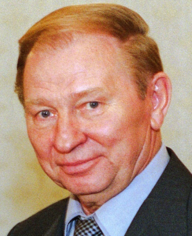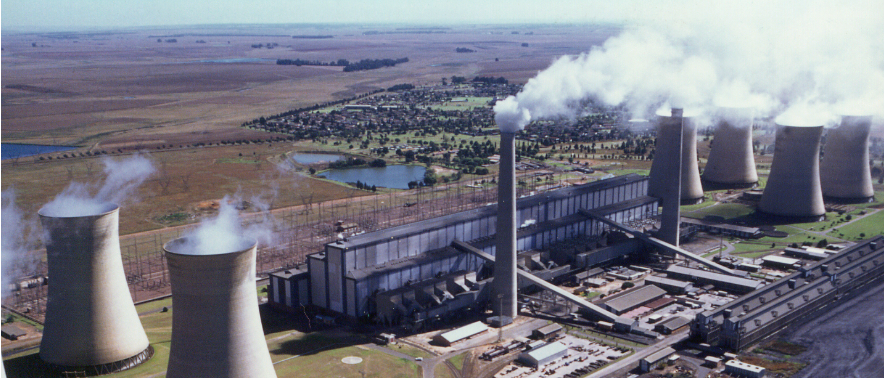‘Ukraine is turning into a territory where nothing works’
Former Ukrainian President Leonid Kuchma warned that Ukraine was rapidly becoming a lawlessness territory "where nothing works". But could that be impacting South Africa?
Published: May 9, 2018, 9:11 am
“Earlier, for a decade I supported Ukraine’s independence, I said that Ukraine was in my opinion established as an independent state. Now I want to say that we are very quickly today turning into a territory where nothing works, neither the Constitution, nor laws,” Kuchma said.
The former president reminded the government that it was necessary to follow the provisions of the existing Constitution in order to understand what changes needed to be made.

Former Ukrainian president Leonid Kuchma, Notably during Kuchma’s presidency, Ukrainian-Russian ties began to improve. Wikipedia.
He chided the Ukrainian authorities for their short-sightedness in proposing quick fixes. He said President Poroshenko was leading the country to economic collapse.
“We must always think about tomorrow, and not that many politicians do, since they are instead striving to make themselves great,” he said.
As an example, the ex-president cited policies and decisions made by the current leadership of Ukraine in the energy sector. The blockade of Donbass, he said, was unprofitable for Ukraine.
“Here we are buying coal in the Republic of South Africa and America. Have we become too rich?” he remarked dryly.
Because of the conflict in Donbass – according to the Ukrainian Energy and Coal Industry Ministry – raw coal production in Ukraine dropped by 22.4 percent from 2013, to 64.976 million tonnes. As a result, Ukraine began importing power-generating coal from South Africa and Centrenergo, mined in Pennsylvania, in the US.
US and South African anthracite is helping to keep the lights on in Kiev, also warming President Poroshenko’s relations with the US, even though Ukraine was once a major producer of anthracite, a coal used in power generation.
Neighbouring Poland has also turned to US coal. Its imports from the United States jumped five-fold from 2017 to 839 000 tonnes, data from the state-run ARP agency showed.
US utilities are meanwhile shutting down their coal-fired plants in a shift to gas, wind and solar power. Therefore boosting exports to eastern European countries is a way to limit Russian influence and keep American jobs in the coal sector.
But South Africa is struggling because of the deal. Power utility Eskom says six of its power stations do not have adequate coal supply, and could face shortages. Last month Eskom received approval from the country’s National Treasury to source additional coal from elsewhere.
Eskom’s spokesperson Khulu Phasiwe explained to Eyewitness News last month: “They have very low stockpiles, and this is a big concern Eskom. We’re diverting coal from other stations so that we can keep the system running.”
Leaked minutes from an Eskom meeting revealed that managers were warned that the Hendrina power station could be forced to shut down. Alternatively, they would have to use expensive open cycle gas turbines or hit consumers with load shedding. South Africans faced rolling power cuts in 2008 as the power utility struggled to keep the lights on.
The deal with South African companies to export 1 million tons of coal to Ukraine, was hailed as a “temporary relief measure to mitigate the effects of the Ukraine conflict” and the exports were expected to drive up demand and prices, analyst Xavier Prevost of XMP Consulting told IOL’s Business Report in 2014.
“I don’t think Ukraine will be in conflict with Russia forever. I think that everyone in the coal industry is going to benefit from the deal, which will raise prices,” he added.
Thando Mkatshana, the chief executive of the African Rainbow Minerals coal division, said the exports to Ukraine were “a positive development for the local industry. We have seen a price rise. We cannot hope for the war to continue for longer. We can hope to extend into territories like Ukraine”.
Kuchma also recalled the crisis in the oil and gas sector.
“I do not want to talk about gas, about what we have done. We are now promised a piece of pipe to fill with gas. But, even for technological purposes, it is not enough after the commissioning of the South Stream II. The country is rapidly moving towards an empty gas pipe,” Kuchma said, recalling that the equipment was worn out on the Ukrainian hydraulic system.
In April, Verkhovna Rada deputy Murayev voiced similar concerns, saying that Ukraine’s current political course could lead to the disintegration of the country.
The participants of Maidan 2013-2014, have become disappointed by the outcome of the “revolution of dignity”. Instead of dignity, they saw price increases and gay parades allowed in cities, a spokeswoman for the The Right Sector said, speaking at a rally.
In February, one of the leading figures of the punitive battalion Azov, Deputy Biletsky urged Ukrainian Nazis to destroy the regime of Poroshenko because he had failed to deliver.
All rights reserved. You have permission to quote freely from the articles provided that the source (www.freewestmedia.com) is given. Photos may not be used without our consent.
Consider donating to support our work
Help us to produce more articles like this. FreeWestMedia is depending on donations from our readers to keep going. With your help, we expose the mainstream fake news agenda.
Keep your language polite. Readers from many different countries visit and contribute to Free West Media and we must therefore obey the rules in, for example, Germany. Illegal content will be deleted.
If you have been approved to post comments without preview from FWM, you are responsible for violations of any law. This means that FWM may be forced to cooperate with authorities in a possible crime investigation.
If your comments are subject to preview by FWM, please be patient. We continually review comments but depending on the time of day it can take up to several hours before your comment is reviewed.
We reserve the right to delete comments that are offensive, contain slander or foul language, or are irrelevant to the discussion.

Swedish military wants to remilitarize the Åland Islands
The demilitarized autonomy has previously been known as 'the islands of peace.

NOAA Predicts Zero Sunspots for Almost the Whole 2030s
CLIMATEThe United States' government scientific organization, the National Oceanic and Atmospheric Administration (NOAA), predicts zero sunspots from 2031 to 2040. This is an extreme situation that has not occurred in as long as humanity has been counting sunspots, and it leads us into uncharted territory in terms of our solar system. However, this prediction aligns with the warnings of the world-renowned solar researcher Valentina Zharkova for many years, who indicated in 2019 various signs of this catastrophic phenomenon, including the extreme hailstorms we have seen in Europe and the world this summer. The forecast and various observations this year give cause for very significant concern. In this unique analysis, Free West Media explains why.

European Nationalist Parties Forge Cooperation Ahead of EU Elections
EUROPEAN ELECTIONSOn Saturday, August 26, representatives of six European nationalist parties gathered in Budapest. The meeting was initiated by the Hungarian party Mi Hazánk and took place in the national parliament. Representatives of the parties signed a joint declaration that not only reaffirms the parties' friendship but also their unity on a range of complex political issues. A surprisingly clear and radical manifesto was established. The hope is that this cooperation will lead to success in the EU elections and eventually result in the formation of a group in the European Parliament. For Swedish nationalism, this meeting marks a success as Sweden, for the first time, has a party represented in a leading nationalist cooperation in Europe. Free West Media was present at this historic event.

Turkey Believes Sweden Hasn’t Done Enough
Sweden will have to wait a bit longer for NATO membership, according to Turkey's Justice Minister Jilmaz Tunc. First, Sweden must extradite the "terrorists" Turkey wants and stop the desecration of the Quran.

Swedish Weapon Takes Down Russia’s Best Attack Helicopter
The Russian attack helicopter Ka-52 is considered one of the world's best and has struck fear in Ukraine, where it has hunted down tanks and other armored vehicles, often beyond the range of many light anti-aircraft systems. However, it has met its match in the Swedish air defense missile system RBS 70, which has quickly led to significant losses for the Russian helicopter forces.

Strong Confidence in German AfD
Alternative for Germany (AfD) held a party conference on July 29-30 to select candidates for the upcoming EU election next year. EU Parliament member Maximilian Krah, belonging to the party's more radical, ethnonationalist faction, was appointed as the top candidate. The party's two spokespersons delivered powerful speeches criticizing the EU's failed migration policy and trade sanctions that isolate Europe and Germany from the rest of the world. They argued that it's time for the EU to return a significant portion of its power to national parliaments. However, they have dropped the demand for Germany to exit the EU.

The Establishment Wants to Ban Germany’s Second Largest Party – for the Sake of Democracy
The rising popularity of AfD has raised strong concerns within the establishment. Despite lies and demonization in the media and isolation from the overall political establishment, the party continues to grow. Certain representatives of the party are accused of becoming increasingly "extreme," and in an unusual move, the influential weekly newspaper Der Spiegel demanded that AfD be "banned."

Dutch FvD break through the media blockade
What is happening in the Netherlands? It is often difficult to follow events in other countries, especially when distorted by system media. We give Forum for Democracy (FvD) the opportunity to speak out on the political situation in the Netherlands and the staunch resistance they face in trying to save the country.

The Ursula von der Leyen Affair
After a criminal complaint in Belgium against the President of the European Commission, the so-called SMS-case, now takes a new turn. The judge responsible for the investigation will likely gain access to the secret messages exchanged between Ursula von der Leyen and Albert Bourla, CEO of Pfizer, at least if they haven't been deleted.

Publisher of Unique Literature Worldwide Blocked by International Distributor
Arktos has distinguished itself by publishing groundbreaking philosophers and social critics. Now, the publisher's international distributor has abruptly terminated the cooperation, and more than 400 already printed titles cannot reach their audience. There is strong evidence that the distributor has been under pressure, something that has also happened in Sweden. We have spoken with Arktos founder Daniel Friberg about the ongoing struggle for freedom of speech in a shrinking cultural corridor.

